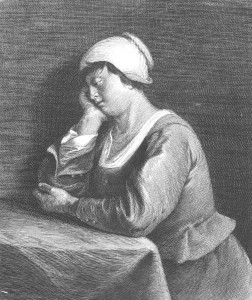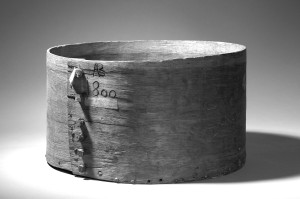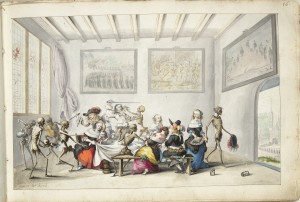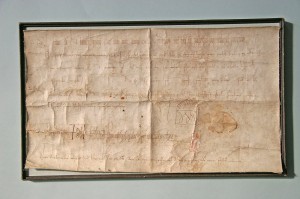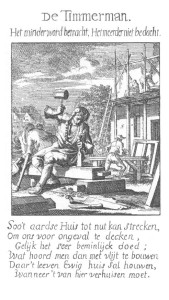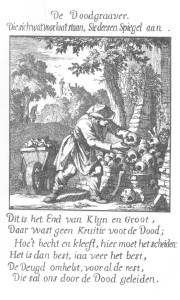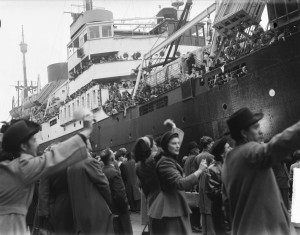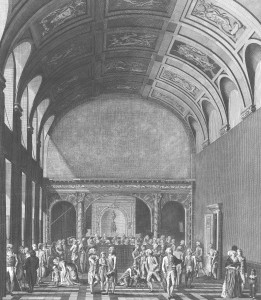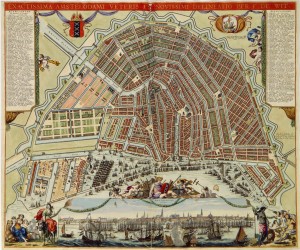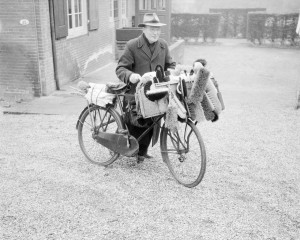A particulier is a private person, someone not working for the government and not a business. For instance, when you buy something, it is important whether you buy it as a particulier (consumer) or as a business since your warranty may be different. In some records, the term was used to indicate a person who did not receive an income from current employment or running a business. This does not necessarily mean that the person was unemployed or poor, it could also be a person of independent … [Read more...]
Dutch term – Schepel
A schepel is a measure of surface as well as of capacity. One schepel of land used to be the amount of land you could sow with one schepel of grain. You may encounter the term in land records or tax records. The size of a schepel differed from one region to the next. For example, in Gelderland, a schepel of land was about 1450 m2, or 0.36 acres. In Twente, a schepel was about 887 m2 or 0.22 acres.1 Source "Schepel (oppervlaktemaat)," Wikipedia, … [Read more...]
Dutch term – Dood
The word Dood means dead or deceased. Information about deaths can be found in death records (after 1811) or burial records (before 1811). In most cases, it will not be possible to find a cause of death. … [Read more...]
Dutch term – Archiefstuk
An Archiefstuk is an archival record, a document created or received in the course of a person or organization's activities or tasks. The oldest surviving archiefstuk in the Netherlands is a 950 charter whereby King Otto I granted the right of a market and toll to Cassalum (unidentified location). The charter is kept by the Regionaal Historisch Centrum Limburg. … [Read more...]
Dutch term – Gezel
A gezel is a journeyman, a craftsman who had already finished basic training but had not passed his master's exam yet and had not been admitted to the guild. The term is also used to indicate someone who worked for a boss rather than having their own shop, so a gezel doesn't mean the person is young. You can find the word gezel used as a suffix to other occupations, for example a timmermansgezel (journeyman carpenter) or schoenmakersgezel (journeyman shoemaker). You won't find these composite … [Read more...]
Dutch term – Doodgraver
The term doodgraver literally means 'dead digger.' It is the person who digs the graves for the dead. In larger towns, this was a full-time occupation. In small towns, the church sometimes hired poor people to dig the graves, making them work for their allowance. A grave digger was not only supposed to dig the graves but also to collect any bones that would surface before the dogs could get to them. These bones would often be stored in a 'knekelhuisje' [bone house] in the corner of the … [Read more...]
Source – Staten van Landverhuizers
In the 1840s, when religious tensions were high and crops were failing, many people left the Netherlands to start a new life in America. The national government wanted to know what was going on. Since 1848, they required each province to keep lists of emigrants, the "Staten van Landverhuizers" [tables of emigrants]. Between 1831 and 1847, only numbers were recorded, but since 1848 the heads of households were listed. Contents of the Staten van Landverhuizers The provincial lists were compiled … [Read more...]
Dutch term – Schepenbank
The schepenbank is the bench of aldermen, or the aldermen's court. The schepenen were the officials who set on the bench. The schepenbank would serve as the magistrate and as a court of law. The term Schepenbank was not used in all regions. Other terms include nedergerecht (Friesland) or vierschaar (Zeeland). Schepenbanken with higher jurisdiction were entitled to adjudicate all court cases, including capital cases. Schepenbanken with lower jurisdiction only adjudicated less severe cases. … [Read more...]
Dutch term – Kaart
A kaart is a map or a card. In the 17th century, Amsterdam was the map making capital of the world so there are some gorgeous maps waiting for you to see where your ancestors lived. For example, check the Blaeu Atlas at the Erfgoed Leiden website or read about the the facsimile edition of the City Atlas of Frederik de Wit. … [Read more...]
Dutch term – Fiets
As the Tour de France starts in the Netherlands this week, this is a good time to learn the meaning of a quintessentially Dutch word: fiets (bicycle). Introduction of bikes Fietsen were introduced in the Netherlands in the last part of the 19th century. They were quickly adopted and became the most popular mode of transportation. Fietsen were not just used for personal transportation, but also by businesses (a 'bakfiets' with a container on the front wheel can be used to carry many goods) and … [Read more...]
